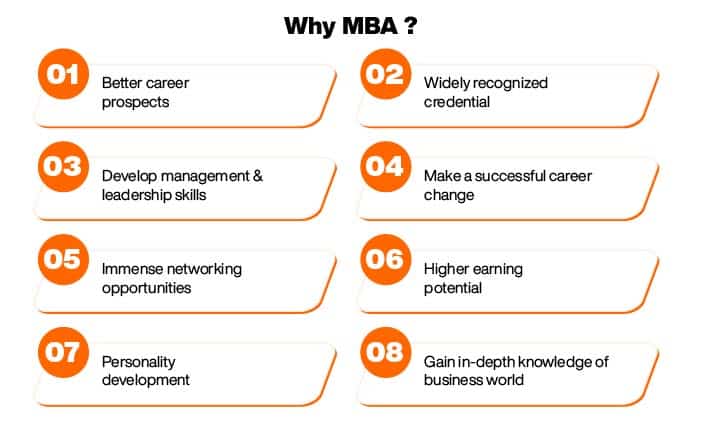Enrolling in an MBA program after an engineering degree is a compelling proposition for individuals aiming to supercharge their career trajectories. While engineering guarantees technical adeptness, an MBA complements this skill set by offering business acumen, refined leadership skills, and a strategic mindset. The combination of engineering and MBA education creates a unique blend of expertise that is increasingly sought after by employers across various sectors. Engineers armed with an MBA are better equipped to comprehend the intricate interplay between technology and business dynamics, leading to informed decision-making and the successful execution of projects.
An MBA after engineering can help professionals secure management and leadership roles early in their careers. The holistic skill set gained from this combination enables engineers to transition seamlessly from technical roles to positions involving strategic planning, team management, and even entrepreneurship. This versatility not only opens doors to diverse industries but also paves the way for getting into pivotal roles that drive innovation and organizational growth.
This article delves into the manifold MBA advantages for engineering graduates, illuminating how this dual proficiency can strengthen career pathways, foster leadership skills, and unlock diverse opportunities in the industry.
Online Manipal can help you on your journey to career growth. Visit the website to learn more about the prestigious courses listed online.
Also Read: Top 5 Reasons Why MBA is the Best Through Online Manipal
Demand for professionals with technical and business acumen in today’s job market
In the current job market, the demand for individuals with a useful blend of technical proficiency and business acumen has grown exponentially. This convergence of skills is now sought after as organizations recognize its potential to drive holistic growth and innovation. Professionals who can seamlessly navigate both the technical and business realms are uniquely positioned to translate intricate technical details into strategic business decisions.
Their capacity to grasp the nuances of emerging technologies and assess their market relevance empowers them to guide projects that are not only innovative but also aligned with organizational objectives. This multidimensional skill set also facilitates effective communication between technical teams and non-technical stakeholders. Professionals who can bridge this gap contribute to smoother project execution, as they convey complex technical concepts in a language that resonates with decision-makers and clients alike.
Furthermore, the evolution of industries in the digital age underscores the significance of individuals with this hybrid expertise. As companies harness technology to optimize processes and enhance customer experiences, professionals who understand both the technical possibilities and the business implications are invaluable.
They play a pivotal role in driving digital transformation, from identifying emerging tech trends that could disrupt the status quo to envisioning strategies that leverage these trends for sustained growth. So, the blend of engineering and MBA benefits an individual professionally by positioning them as catalysts for innovation and drivers of organizational success. As industries continue to evolve, those who can seamlessly operate in the confluence of technology and business are poised to lead the way forward, shaping the trajectory of their respective sectors.
Read More: Is pursuing an MBA worth it for working professionals?
Advantages of pursuing an MBA after engineering
Pursuing an MBA after completing an engineering degree offers a multitude of advantages that can significantly enhance one’s career trajectory.
- Diverse career paths:
Integrating an MBA with an engineering background offers a bridge to multifarious career trajectories. This dual qualification empowers individuals to transition into roles that require a fusion of technical expertise and business proficiency. Industries such as technology consulting, product management, investment banking, and entrepreneurship become accessible avenues, allowing for dynamic career exploration.
- Broad skill set development:
While engineering cultivates analytical and problem-solving aptitudes, an MBA program augments these skills with a comprehensive array of proficiencies. From negotiation tactics to marketing strategies, and from operational efficiency to leadership strategies, engineers gain a broader spectrum of competencies that foster adaptability in a rapidly evolving business landscape.
- Leadership roles:
An MBA curriculum strategically hones leadership abilities. Engineering professionals armed with an MBA are primed to ascend into leadership roles, equipped with refined decision-making capabilities, adeptness in managing cross-functional teams, and a strategic mindset to guide organizations toward growth and innovation.
- Ideal for aspiring entrepreneurs:
Engineers aspiring to become entrepreneurs gain substantial value from an MBA. Business plan development, financial management, risk assessment, and marketing techniques impart the skills and confidence required to navigate the challenges of entrepreneurship successfully.
- Network building:
Diverse professionals and industry experts coming together on a common platform, joined by similar educational backgrounds, creates an extensive network that enriches one’s professional journey. These connections extend beyond the program, providing continuous opportunities for collaboration, mentorship, and partnership, enriching career prospects.
- Enhanced salary packages:
The fusion of technical prowess and business acumen positions MBA-qualified engineers as valuable assets to organizations. Their capacity to comprehend complex technical intricacies while aligning them with overall business objectives often results in remuneration packages that justify this unique skill set.
- Career progression:
Career growth with MBA after engineering is immense as the combined knowledge from both domains propels professionals along an accelerated trajectory. Their proficiency in navigating both technical complexities and strategic business aspects enables them to stand out in their careers, qualifying them for rapid promotions and leadership responsibilities.
- Holistic business perspective:
An MBA education imparts a panoramic outlook on business challenges. Engineers learn to factor in not just technical feasibility but also financial viability, market trends, and customer needs when making decisions. This holistic perspective cultivates better-informed strategies and enhances decision-making efficacy.
- Global exposure:
Many MBA programs have an international focus, preparing engineers for the interconnected global business landscape. Exposure to diverse cultures, business practices, and market dynamics equips professionals to thrive in cross-border collaborations and multinational enterprises.
- Personal growth:
Undertaking an MBA journey entails stepping beyond one’s comfort zone, embracing new subjects, and collaborating with a diverse peer group. This personal evolution fosters enhanced self-assurance, adaptability, and a broader worldview, crucial for success in contemporary workplaces.
Find the best courses on Online Manipal and realize your dream of becoming a tech-savvy management professional.

Read More: Exploring career opportunities in business management: What you need to know
How to choose the right MBA specialization after engineering
Choosing the right MBA specialization post-engineering demands a systematic approach. Initiate by introspecting your skills, interests, and long-term objectives. Thoroughly investigate the current market trends and potential growth areas in business. If your engineering background aligns with your interests, a specialized MBA in fields like Technology Management or Innovation might suit you. Furthermore, seek advice from professionals already established in the domains that interest you.
Your engineering background could also work well with analytical specializations such as Business Analytics or Finance. Assess the synergy between your engineering know-how and the requirements of the field of study you intend to select. Reflect on your career goals and ascertain whether a particular specialization helps you achieve them. This deliberate and comprehensive approach will empower you to make an informed decision that leverages your engineering foundation and propels you toward a successful managerial career.
Also Read: Top soft skills required for today’s global workforce
Reasons to choose online MBA from Manipal University Jaipur after your B.Tech
Enrolling in an online MBA program through Online Manipal from Manipal University Jaipur following your B.Tech degree is a deliberate choice that melds technical proficiency with managerial acumen. This academic pathway offers a comprehensive curriculum, delivered by experienced educators, ensuring a solid foundation in business principles. Manipal’s strong reputation adds credibility to your qualifications, opening doors to a wide array of career opportunities. The online format of the program allows you to seamlessly integrate advanced learning and continued education into your current commitments, without disrupting your professional trajectory.
By embarking on this academic journey, you’re equipping yourself with a versatile skill set, which connects analytical thinking from your engineering background with the strategic mindset required for effective decision-making in the corporate world. This convergence of disciplines positions you as a dynamic professional capable of addressing multifaceted challenges. Additionally, the program’s emphasis on teamwork, leadership, and communication further refines your interpersonal abilities, vital for succeeding in managerial roles. Overall, an online MBA from Manipal University Jaipur strengthens your qualifications, presenting you as a valuable asset capable of bridging the gap between technology and management.
High-quality course curriculum, flexible learning schedules, world-class faculty, attractive scholarships, easy financing options, user-friendly LMS, and placement assistance are some of the key features of these online programs.
Read More: Passion or degree: How to get a degree while still chasing your dream
Conclusion
Incorporating an MBA into your educational journey after completing an engineering degree can be a strategic decision. The combined expertise in engineering and business opens up a plethora of opportunities across industries and roles. From fostering leadership skills to enabling career transitions and enhancing earning potential, the benefits of an MBA as a pathway for engineers are both immediate and long-lasting. By investing in this dual skill set, you position yourself as a competitive professional capable of driving innovation and success in today’s complex and dynamic business landscape.
Become future-ready with our online MBA program













